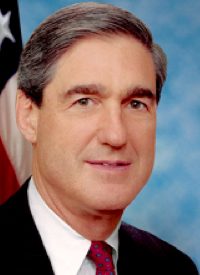
"I have to go back. Uh, I’m not certain whether that was addressed or not," Mueller said in response to a question from Rep. Tom Graves (R-Ga.) about whether a legal distinction had been made between targeting here and overseas those U.S. citizens who, government officials believe, are plotting or carrying out deadly terrorist activities against the United States. "I’m going to defer that to others in the Department of Justice," Mueller said in his testimony on March 7, just two days after Holder, in a speech at Northwestern University in Chicago, laid out the administration’s three-part test to determine whether a U..S. citizen involved in terrorist activity with al-Qaeda or other organizations may be legally targeted for killing.
"First, the U.S. government has determined, after a thorough and careful review, that the individual poses an imminent threat of violent attack against the United States; second, capture is not feasible; and third, the operation would be conducted in a manner consistent with applicable law of war principles," Holder said.
Last October a U.S. drone strike in Yemen killed Anwar al-Awlaki, an American-born Muslim cleric believed to have conspired with "underwear bomber" Farouk Abdulmutallab in the failed attempt to set off an explosion aboard Northwest flight 253 as it was landing in Detroit on Christmas Day, 2009. Awlaki is also said to have inspired the shooting spree by Army psychiatrist Major Nidal Malik Hasan that killed 12 and wounded 31 people at Fort Hood, Texas, in November 2009. Awlaki’s driver, the publisher of an online magazine described as a terrorist publication, was killed in the same drone attack. Two week’s later Awlaki’s 16-year-old son was killed in another U.S. air strike, also in Yemen. U.S. officials said Awlaki’s driver and his son were not targets, but were collateral damage.
The policy of targeting U.S. citizens has resulted in sharp criticism from the political Left and Right in the United States ever since news leaked that Awlaki’s name was on a White House list of terror suspects designated for killing. The targets are reportedly selected by the CIA and the Department of Defense and presented to the Attorney General and the President for approval. After Awlaki’s killing, U.S. Rep. Ron Paul of Texas, a Republican presidential candidate, denounced the policy in an op-ed piece appearing in the New York Daily News.
"President Obama apparently believes he is not bound by the Constitution or the rule of law," Paul wrote. While describing Awlaki as "a detestable person," Paul argued that under the Constitution, "American citizens, even those living abroad, must be charged with a crime before being sentenced. As President, I would have arrested Awlaki, brought him to the U.S., tried him and pushed for the stiffest punishment allowed by law." But Holder in his Northwestern speech said capturing a terror suspect in another country is not always possible.
"Given the nature of how terrorists act and where they tend to hide, it may not always be feasible to capture a United States citizen terrorist who presents an imminent threat of violent attack," he said. "In that case, our government has the clear authority to defend the United States with lethal force."
The Attorney General did not address the question of whether American citizens may be targeted inside the United States, but he made it clear the war on terror is no respecter of geographic boundaries. "Neither Congress nor our federal courts has limited the geographic scope of our ability to use force to the current conflict in Afghanistan," he said.
Late last year Congress passed the National Defense Authorization Act, a provision of which allows the President to use the military to arrest terrorist suspects inside the United States. The legislation designated the entire world, including "the homeland," as the battlefield in the war on terror. President Obama signed the bill into law on New Year’s Eve.
Critics of the targeting policy have cited the Fifth Amendment of the U.S. Constitution, which guarantees, "No person shall be … deprived of life, liberty and property without due process of law." But at Northwestern, Holder argued that a non-judicial review of a case by administration officials can meet the requirement of "due process."
"Due process and judicial process are not one and the same, particularly when it comes to national security," the Attorney General said. "The Constitution guarantees due process, not judicial process." Jonathan Turley, a professor of law at George Washington University, denounced that argument as "Orwellian" and described Holder’s claims as something the framers of the Constitution would have regarded as "the very definition of authoritarian power." Turley expressed regret the Attorney General’s remarks at Northwestern were met "not with outcry but muted applause." The law professor was himself hard pressed to find anything in the speech to applaud.
"The good news," he said, "is that Holder promised not to hunt citizens for sport."
Photo: FBI Director Robert Mueller



